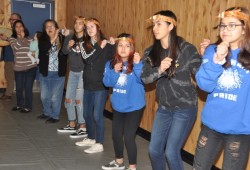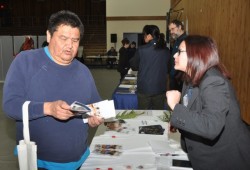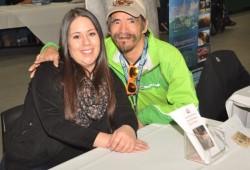The annual Nuu-chah-nulth Education and Training Program Career Fair took place at Athletic Hall on March 7.
The event attracts a wide variety of potential employers, from the high-profile government agencies such as the RCMP and Canadian Armed Forces, as well as service providers and resource companies. A growing number of these employers are Aboriginal.
On average, about 600 people attend the fair, but it has gone as high as 750. In some cases, schools bus in whole classes of students.
Ian Caplette, Director of Education, Training and Social Development, said the employment fair has evolved into a community event, rather than specific to Nuu-chah-nulth members.
“This event is open for all Aboriginal people to participate, but what happens is, we have an open door – anybody who comes in is welcome to be here,” he said. “But primarily, we provide opportunities for Aboriginal people to be able to look at what their future may be, and to have the multiple service-delivery organizations here to inspire them to think about what they might want to do.”
Shan Ross, the NTC’s special projects coordinator, said the trades continue to offer many of the best opportunities for young people to pursue. Partly that is about demographics – because the workforce is aging rapidly, many tradespeople are retiring, opening up new opportunities for trained workers.
There are the more familiar trades such as construction, electrical, plumbing and gas fitting, but there are a host of new certified trades, Ross said.
“We’ve had some success with trades programs on the West Coast,” he said.
Ross said for people in small communities, trades training that can last up to four years sets up a double challenge.
“On one hand, it’s hard to get people to leave to get trained,” he explained, saying this can be particularly hard for a young family with roots in their community. “Their kids might be in school. And then it’s harder to get them to come back.”
Ross said that a goal of the Special Projects program is to “bring training to the communities.”
“I usually work with the nations and employers, and non-profit organizations,” he said. In some cases, potential employers can apply for wage-subsidy funding for specific projects, or alternately, for Summer Youth Employment funds.
“They may be looking to have 16 members of a nation receive certification training – everything from ‘chainsaw’ right into ‘accounting’ – and anything in between.”
Luke George was on hand to talk about the North Island College Aboriginal Education program.
“Aboriginal Education is specific to Aboriginal students,” George explained. “We have many programs that have reserved seating for Aboriginal students, such as our Human Service Worker certificate, Early Childhood Education, Licensed Practical Nursing and Healthcare Assistant.”
“We have other courses for Aboriginal students, such as Nuu-chah-nulth Zero-96 and -97. And, here in Port Alberni, our Human Services Worker certificate is Aboriginal-focused (it is open to all students, he noted). We also have the Aboriginal Leadership program in Campbell River. That is part-time, through distance-education.”
At the Nuu-chah-nulth Child & Youth Services exhibit, research assistant Krista-Lynn Joseph is encouraging visitors to take part in a community initiative to promote the healthy development of children.
“NTC Child and Youth Services, along with NTC Nursing, has applied for funding from the Canadian Institute for Health Research,” Joseph said. “This project aims to gather information from our 14 Nuu-chah-nulth nations to see what the health and wellness goals are, related to child development and maternal/child health, and we’ve been having gatherings in each of our nations, to have conversations about how we can continue to raise healthy families and healthy children.”
The goal of the survey is to determine how the nations would like to move forward with a research proposal, she explained.
At the INEO Employment Services booth, Ambar Varela told Ha-shilth-sa about a new program known as STEP-YA.
“We are recruiting people between 18 and 24 years old who are currently unemployed, or are part-time students, or in precarious situations,” she explained.
The goal is to provide trades, healthcare or retail training. Clients receive minimum wage while receiving the training.
“We are also expecting to get some new programs for seniors and women who are survivors of violence,” Varela said. “We are working with ACAWS [Alberni Community and Women’s Services] and other organizations in town to bring training to people with higher barriers to employment.
“Thirty-seven per cent of our clients are Indigenous people. One feature of our program for youth is that we are incorporating a cultural component,” she explained. While Nuu-chah-nulth culture is a priority, other Indigenous cultures are included in the mix.
Not all the career-seekers were students. Lory Campbell admits to being “fifty-something,” and is struggling to maintain employment, despite the fact that he holds numerous certifications – janitorial, woodworking, dry-walling and cabinet-making, just to name a few.
“I’m looking for anything right now. I hold all sorts of tickets, but most of them are just short-term. They’re not permanent – they’re mostly seasonal,” he said. “Right now, I just looked at the Coast Guard… the health [trades], and INEO… I’m still making my way around.”










